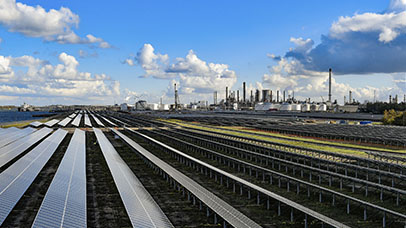Downstream
Key figures in 2019
Cash flow from operations
billion
refinery and chemical plant availability
weighted average
Shell-branded retail sites
serving more than 30 million customers daily
barrels of crude traded per day
million
Refineries
in operation
Global lubricant supplier
for 13 consecutive years
Experience in fuel development
years
Biofuels blended into our petrol and diesel
billion litres of biofuels worldwide
Average number of employees
Our Downstream business manages different oil products and chemicals activities as part of an integrated value chain that trades and refines crude oil and other feedstocks into products. These are marketed for domestic, industrial and transport use.
Downstream includes the Shell Trading and Supply organisation, which trades crude oil, natural gas, liquefied natural gas (LNG), electricity, refined products, chemical feedstocks and environmental products. Trading and Supply combines our network of trading companies, shipping and maritime capabilities and an integrated network of supply and distribution activities.
Shell Trading and Supply is one of the largest transport and trading operations globally with its main hubs in London, Houston, Singapore, Dubai and Rotterdam. It also has trading offices in Canada, the Bahamas and Spain.
Marketing represents Shell’s customer-facing businesses. We market our products around the world for domestic, industrial and transport use. Shell is the world’s largest mobility retailer, by number of sites, with 45,000 service stations operating in close to 80 countries at the end of 2019. We operate different models across these markets, from full ownership of retail sites to brand licensing agreements.
The earnings of our Downstream business are dependent on demand for oil products and chemicals, as well as on the availability of refineries and chemical plants. In 2019, Downstream earnings decreased compared with 2018 because of lower realised refining, trading and chemicals margins. This was partly offset by higher margins in the Marketing businesses.
 Message from the Chief Financial Officer
Message from the Chief Financial Officer
 Shell’s approach to taxes
Shell’s approach to taxes
 Special topics
Special topics
 Our tax data
Our tax data
